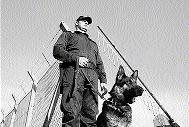Mark Titus, Freelance Writer
WESTERN BUREAU:
The Sunday Gleaner has found that some private security companies' employment and training protocol is not as rigid as it should be. Except for a test in written skills, newly-recruited security guards are sent on the job without any basic training.
In an undercover exercise, this reporter applied for a job as a security guard in one of the country's leading security companies.
This particular company was chosen because it is considered to be the flagship for other companies, in terms of training. The age limit for a recruit is 20 years, but other factors worked in my favour.
On my arrival at the company's regional office in Ocho Rios, St. Ann, an elderly female security guard told me to sit and wait along with two other recruits.
No Physical Training
"We need guards, 'cause we short, but we need people that want to work. Some of the guards don't come to work especially when they are paid," she advised. "Don't worry, the test is not hard, just read carefully before you answer."
The test, which included spelling, reasoning ability and basic mathematics, also required that we write a short autobiography. The paper was marked immediately, and being successful, I was instructed to return the following Monday to begin training and classes.
With the expectation that there would be some physical training, as well as practical exercises in relation to the day-to-day operations of a private security company, I equipped myself accordingly.
However, all we did for five days was to study from a prepared
security document, which covered topics such as observation, patrolling, code of ethics, code of conduct, security breaches, use of the portable radios and the handling of the canine (which was compulsory), with the 'instructor' popping in once or twice per day to have a chat, which on most occasions bore no relevance to our training.
There was absolutely no physical training, neither was there any
simulation exercise of any kind to assist us in understanding our tasks as security officers.
On the penultimate day of training, our instructor spent two hours telling us what to expect on the final test and discussed the topics.
The exam day was a tense moment among the seven of us, especially for me. I had not studied but my colleagues could be heard reciting the contents of the manual from front to back.
My investigation was not complete and I could not afford to fail at this point. With a 67 per cent pass mark, I now had only one obstacle left.
What kind of background check is done on recruits in our private security services?
Required Documents
My fellow recruits produced the required documents: recommendation from a police officer not lower than the rank of sergeant, minister of religion and a Justice of the Peace and four passport-size photographs stamped by the JP.
I got a reference from my police friend, who is a corporal, but no calls were made to him to check on my character. It was the same thing with the minister of religion.
There was conveniently no recommendation from a JP. However, for my soon-to-be employers, this was not a problem. I was referred to a JP who is based in Ocho Rios.
"Him will sort you out; but you haffi run a ting pan him. A him help me out when mi did a come inna di system," advised one guard who saw my desperation.
I went to the location about 9 a.m. on Monday, May 8, but no one was seen there. I saw a newspaper vendor and inquired about the JP.
"Yes, big man, him still deh bout, but dem man deh nah come out till 'bout 10 o'clock," he said, "Stay right yah so, you soon see him come wid him stool."
I wasn't the only client that morning, as during my wait for the JP's arrival, I noticed a small gathering of customers.
Placing himself on a stool, the JP looked around suspiciously while preparing the required documents for his continuously increasing number of clients, including driver's licence and passport applicants. After affixing his signature and seal to the documents, the JP stealthily collected his 'fee'.
Now it was my turn. I told him that I was sent by the security company and stated my request. He asked me to write the recommendation and then signed the recommendation and passport photos. I was now equipped with signed documents from a JP, who had never seen me before, all for $200.
I returned the papers to management and after making arrangements for various salary deductions, I was given my uniform, two pants, two shirts and a cap.
My first assignment was at Dunn's River Falls at 6 p.m. and each duty lasted for 12 hours.
I was handed a dog, but despite a personal fear of the animal - I was never trained to work with them - except for a few command words, there was no briefing. I refused and was eventually placed to watch a portable ATM machine at the attraction.
This duty went on for about eight days and after my first pay cheque of about $11,000, I abandoned the job.
Armed guards along with canine patrols are offered by some local security companies.

